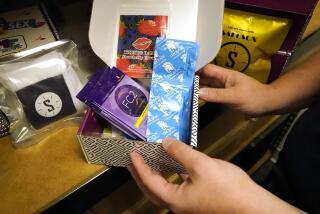Let’s Talk About Sex : “3-2-1” special aims to generate healthy discussion between parents
- Share via
Microwave a mess of popcorn. Settle down on the sofa with the kids. Switch on the tube and get ready for ... sex.
No, producer Steven Bochco hasn’t succeeded in his plans to bring an R-rated series to prime time. Nor has the Playboy Channel taken over the family hour. This is a sex show of the most factual kind: Aimed at parents and pre-teens, and produced by Children’s Television Workshop, “3-2-1 Contact Extra: What Kids Want to Know About Sex and Growing Up” gives straight talk about the birds and the bees in the age of AIDS.
“Everybody has to learn about sex at some point in life,” says Josh Winston, of New York. The seventh-grader, who appears in the show in a group of real-life kids asking pointed questions, sums up why sex education is important for the 8- to 12-year-olds the show is trying to reach.
“Kids know the basics, but nothing in-depth like they covered in the video,” he says, pointing out that his age group and younger hear about sex all the time: “I have cable,” he says. “I went to summer camp.”
Maybe so, parents might wonder, but isn’t fourth grade a little early to be thinking about puberty?
Anne MacLeod, the special’s executive producer, admits that at first, she thought her show’s targeted age group sounded a little young. “But kids have enormous misconceptions,” she says. “They get bombarded with messages in the media that say ‘Hurry up! Be sexy!’ It’s better to correct those misconceptions early.”
Rhonda Wise, one of two sex educators featured in the special, says she’s heard questions from children such as, “If you jump up and down (after sex), will the sperm come out of your body so you won’t get pregnant?” (This is not true, of course.)
“We need to give correct information long before sexual activity is an issue,” Wise says.
To achieve this, “What Kids Want to Know” provides information on puberty and reproduction. Question-and-answer sessions between sex educators and separate groups of boys and girls tackle everything from masturbation to menstruation.
The show also discusses homosexuality, peer pressure, responsibility and AIDS, and is careful to provide only factual information--allowing parents to impart their own values to their children. “We recognized that there is a very diverse population in this country,” says MacLeod, who says it took over a year of research--incorporating comments from more than 700 parents and kids from a variety of backgrounds--to present the material in a manner as straightforward as possible. “This is, after all, a science show.”
OK, so it’s science--why do parents still find it so hard to approach the topic with their kids?
“The discomfort comes from a couple of places,” says Robert Selverstone, a licensed psychologist and sex educator in Connecticut, who also appears in the show. “The first is that we think we don’t know enough. The second is that parents may fear a values conflict with their children’s peer group. But parents have an obligation to talk about what their values are and how they got to that point.”
For parents still wondering how to begin, Selverstone suggests the following hints:
Don’t wait for your kids to come to you.
“The outdated wisdom is that you should only talk (about sex) when kids ask a question. But we don’t wait for them to say, ‘Mom, should I really look both ways before I cross the street?’ ”
Use “Teachable Moments” that show sex can be discussed like any other topic.
“One of my favorite suggestions is to pick up something in the newspaper or on TV that relates to sexuality, and discuss it at the dinner table with other adults. Children will probably feign indifference, but over time they learn that sex is something that can be legitimately discussed, that doesn’t need to be confined to dirty jokes.”
Acknowledge your discomfort.
“It’s quite acceptable for parents to say, ‘I don’t know the answer to that question; let’s look it up.’ That sense of parents’ vulnerability is reassuring to children. It makes it acceptable for the child to not pretend to know everything.”
Let children know sexuality is healthy.
“So much of what’s in the media talks about the negative aspects of sex. We run the risk of raising a generation of children who will make sex therapists the wealthiest people in the nation. We want our kids to become adults who make good decisions in their lives, who use their sexuality in a way that is healthy for them.”
Relax.
“There is a myth of ‘The Talk’ about sex with children. Learning about sex is a cumulative process, and parents don’t have to do it all at one time. They can do it in pieces like a 500-piece jigsaw, showing how each piece fits into the broader picture. We certainly didn’t do it in our one-hour program.”
“3-2-1 Contact Extra: What Kids Want to Know About Sex and Growing Up” airs Wednesday 8-9 p.m. on KCET and KPBS (also May 21 at 5 p.m. on KOCE; May 26 at 8:30 p.m. and May 31 at 6 p.m. on KLCS).
Parents may purchase the video at major video stores for $14.95, or call 1-800-634-4727 to order the tape and accompanying Parents’ Guide. Parents may order the guide only by calling 1-900-407-2000. Cost for the guide and the phone call is $2.25.
More to Read
The complete guide to home viewing
Get Screen Gab for everything about the TV shows and streaming movies everyone’s talking about.
You may occasionally receive promotional content from the Los Angeles Times.






